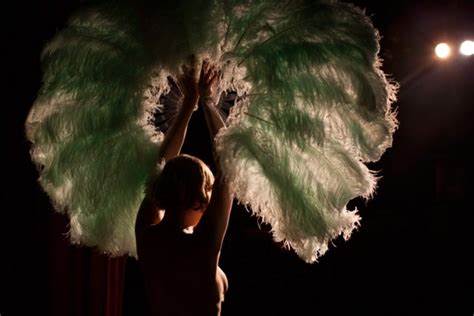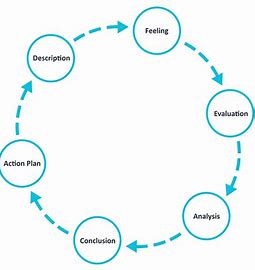
Beyond the curtain: Navigating the tapestry of Cabaret Performance
Setting the stage: In this blog post, I will evaluate my experiences in my work-based learning experience and explore how they have developed using reflective practices. At the beginning of this experience, I tried to explore multiple avenues of crafting professional emails to potential employment providers and then realised that I wanted to experience theatre practice consistently through my experience within this module. I will use the Gibbs cycle of reflection to fully explore the learning I’ve experienced through my time at Cabaret, as this is the most helpful for me to fully develop the situation and learn from it in a way that I can use in my later professional life. Then I will expand on the knowledge I have gained from the experience before Finalising how the learning experience I’ve gained has benefitted me. My end goal is to feel more prepared, connected and ready to enter the industry after my placement ends.
I have previous theatre experience which I was hoping to engage with from the past few years of my degree, through running small drama society plays; I gained experience in design, costume and stage management. After researching local small theatre businesses and creatives, I contacted the Cabaret supper club director, Ross Anderson-Doherty. Ross agreed to speak with me to discuss skill gaps their show was dealing with, mainly within the lack of stage management and flexibility before the peak times of Christmas shows. As this is a complex multiskilled role within a unique inclusive space, they wanted to ensure I would fit within the theatre work environment. They then aided me in exploring the dynamic of the group that run the show, making sure I felt comfortable and familiar with all elements before I agreed to take on the work experience. One of the challenges within the space within the supper club, is the extremely small backstage area, with one room, directly behind the stage. This provided a unique challenge throughout the shows, especially with a larger number of performers on busier evenings such as Saturday nights. Everyone has to be given their own space, with enough time to prepare before their acts and also has to feel comfortable enough to change and prepare before they go on stage. However, this was also beneficial as there is only a backstage team of two (one stage manager and then myself) the small area means that everyone is easily accessible within both on and off-stage space. this is a successful layout within the means provided to the theatre section of the company as it makes for a much more streamlined production.

after exploring a few common reflective practices expanded on within the module content I felt the Gibbs reflective cycle resonated closest to my own experience with the workforce, as I was consistently going through this cycle in my reactions to moments within the production and performing reflection in action without consciously recognising it. For example, during the opening signing act of the performance I pulled back the curtains as our signer Roisin began singing the mic didn’t turn on, so I had to assess the situation quickly. The other stage manager, TJ ran to the sound booth and fixed the situation, I closed the curtains, immediately going to reassure Roisin and make sure she was alright and we decided to just run the start again. The show went well after that point and the audience was endeared towards the performance. In that moment I feel that I cycled through the reflective cycle to create the action plan of starting again and how the performance was successful due to this, as well as my colleagues performing the same level of situational response. Therefore I will be mainly focusing on the Gibbs reflective practice throughout this post. Due to the benefits of including sensory experience experiences, such as feelings, it links well to running fast-paced productions as I came to realise the importance of performers’ well-being. This is important for sensory-based environments such as a cabaret performance. This also provides the perfect evidence for involving members of the audience and dealing with complaints within the show. The cyclical format of the Gibbs reflective process follows perfectly the process of curating and successfully executing a cabaret variety show.
Reporting back for reflection: The Gibbs reflective cycle flows through the now-familiar format for the variety show, here I will explain how each section is cycled through every show and how this is practically applied. The action plan would be easily reminiscent of the show running order, a form structured by the director Ross in advance of the and then placed together by the stage management every show, this is then printed and aligned with a lighting and sound version. This forms an ideal action plan, that explains easily how the show should run.
The next sections of the cycle (description, feelings) would be better seen as the actual performances throughout the show, these are the pieces that would be best described in the show report. It then links into evaluation, as the show has finished and we look at it as a whole, engaging with challenges described in detail and any adaptations that had to be made to the show’s running order (action plan in this example).
The most vital reflective experience I’ve gained from engaging in the shows at Cabaret would be the regular reports completed after every show. This document is then shared with all stage management and crew members, it details the complete timing for the show, including all cast present and timings. This helps to fully optimise the show’s running order and opens a clear and repeated level of communication every week. As the same acts are repeated in most shows this also helps in the feedback we get from audiences and performers each night, for example, if a crowd is quiet and unresponsive at the beginning of the performance then a singer can choose to change a later song to be well-known and more engaging. this adaption within shows can usefully create a better environment and more chances for the audience to return to leave a good review. In reflection, this is written down in the report and means that successes can be recognised and learnt from. However, failures or breakages can be communicated clearly and fixed according to the schedule. For example, the smoke machine broke recently on a Friday night performance at the end of the show, therefore it was included in the report. So the stage managers already fully understood the situation for the Saturday Matinee and had time to review the situation. it was subsequently cleared out and working in time for that show. this really showed me the importance of strong communication and how to best achieve that through a small team.
“It is not sufficient simply to have an experience in order to learn. Without reflecting upon this experience, it may quickly be forgotten, or its learning potential lost. (Gibbs, 1988) this is presented through Gibbs’s reflective model as this clear note-taking process can be stored and used for a multiplicity of uses. For example, if there is an issue and an audience member attempts to get on stage or inappropriately interacts with a member of our cast this is noted in detail in the show report, if a complaint or concern was processed after the show and backstage have to become involved, we have clear records to look back on. This is a highly successful practice as it helps to reassure all members of the show that there is a concise record, and helps them feel comfortable within our performance space. As Gibbs, references here in this quote this process means that there is no concern for any important details being ‘forgotten’ and instead our ‘potential can be gained’, every experience, positive or negative became an important learning experience that I appreciated more through my reflective outlook.
Applause and adversity: An important element of this experience is how it allowed me to fully realise the relationship between a performance and its audience. Over a few shows, it was possible to change elements of the performance to heighten energy levels within the audience depending on how they were reacting. Recently we’ve moved into a new performance, centred on more of a Christmas theme to the variety of acts and the choice of songs has been specific.
It also meant I had to consistently work out the best way to deal politely and navigate the complex working environment. there were repeated issues with members of the audience placing items on stage before the show began, after explaining to many audience members they understood and removed the items. this was also taken to the front of house staff and they began to move the tables further back from the stage to allow for fewer interventions needed. due to the nature of our performance within the supper club space, where alcohol is consumed by almost all audience members consistently throughout the night, it can lead to them becoming rowdy or disruptive. the biggest challenge was reacting at the moment when a drunk audience member stood or attempted to get onto the stage and interact with the performers. Many performers are good at distracting the audience away while we stage managers can speak with the offending audience member. This was surprisingly difficult as it was an unexpected challenge, that occurs fairly regularly. However, I have improved at guiding the few brave audience members that attempted this, down our backstage stairs and getting them back to their party, without much interruption to the main performance. I also understand that this is a unique challenge to this genre of performance where an audience can feel comfortable enough to do that. reflection is definitely done after these moments and improvements are always made to make sure everyone involved is comfortable.
The Final Bow: Overall here I have outlined the key aspects I’ve learned by reflecting on my experience as a stage manager i will take all of these lessons and expand upon my reflective experience to fully engage as my work experience moves forward. I’m currently looking forward to managing more regular shows with much more diverse audiences in the lead-up to Christmas with my next blog post exploring the best lessons I’ve learnt from this next step within the show.